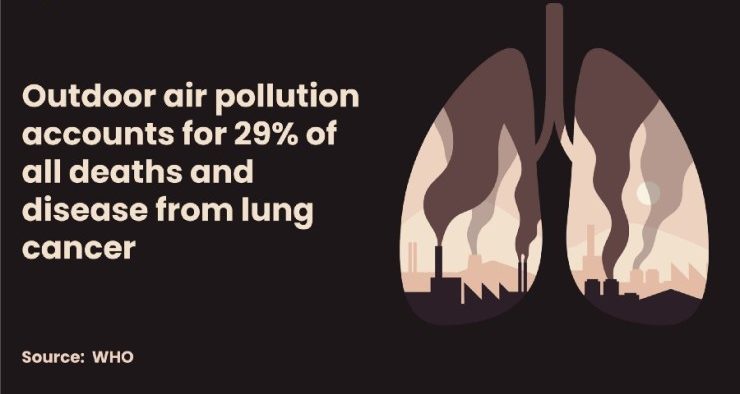By Patience Adejo.

Thirty-nine-year-old widow; Mama Caro lived in a small village in Kogi State where she struggled to earn a living by frying and selling garri. She struggled to make ends meet, but she was determined to see her two daughters through school. She worked tirelessly every day to keep up with the high financial demands from her daughter’s school, because she believed so much in empowering the girl child.
One day, while frying garri to supply to her customers, she began to struggle with her breathing. She gasped for air and fainted. Mama Caro never regained consciousness and died a few hours after being rushed to a health facility, leaving her two daughters behind.
Her medical report stated that she had died of chronic obstructive pulmonary disease. One of the causes of this disease is the long-term exposure to air pollution, which would have started from her frequent exposure to smoke while frying garri.
According to the World Health Organisation (WHO), air pollution is the largest contributor to the top four noncommunicable diseases — stroke, lung cancer, chronic respiratory disease and heart disease — accounting for between one-third and one-quarter of those deaths. It is also responsible for 50% of childhood pneumonia deaths. About seven million deaths each year are attributed to outdoor and household air pollution.

Air pollutants are sometimes visible and sometimes not. While the body can eliminate larger particles of pollutants, it does not eliminate the smaller ones. These smaller pollutants are called fine Particulate Matter (PM2.5). These are tiny particles in the air that makes it seem dark and blurred. They penetrate deep into the lung passageways and are the most harmful pollutants to the health of humans.
Air pollution has been declared a global public health emergency and some countries, including Nigeria, exceed the WHO guideline level for annual PM 2.5 exposure. The 2019 world air quality report published by AirVisual reveals that Nigeria is the 5th most polluted country in Africa, with Kano being the most polluted city in Nigeria followed by Port Harcourt. This is not encouraging given that Nigeria is the first African country to establish a national institutional mechanism for environmental protection.
Efforts must be intensified to improve our air quality as breathing polluted air kills silently and many people do not know about the health risks associated with air pollution.
Precious Adejo is the Programme Coordinator, Nigeria Health Watch
- Source: Nigeria Health Watch



